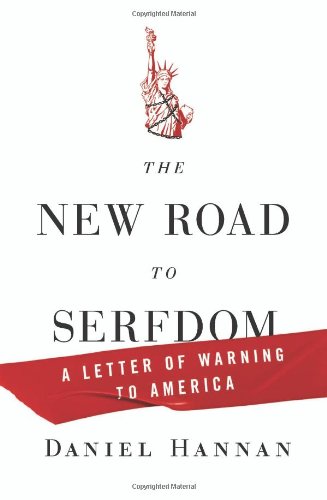The New Road to Serfdom
By Daniel Hannan
(HarperCollins, 2010, 200 pages)
 It is a bold decision to name your book from one of the most influential books in liberal thinking. But Daniel Hannan's The New Road to Serfdom is not some second-rate spinoff of Friedrich Hayek's classic. Instead, it applies the messages and the warnings of The Road to Serfdom to the United States of today. Of all people, Hannan has real-world experience with the growth of a powerful ''super-state'', having been a Member of the European Parliament since 1999. This period has been a time of intense centralisation, in both political and regulatory terms.
It is a bold decision to name your book from one of the most influential books in liberal thinking. But Daniel Hannan's The New Road to Serfdom is not some second-rate spinoff of Friedrich Hayek's classic. Instead, it applies the messages and the warnings of The Road to Serfdom to the United States of today. Of all people, Hannan has real-world experience with the growth of a powerful ''super-state'', having been a Member of the European Parliament since 1999. This period has been a time of intense centralisation, in both political and regulatory terms.
Hannan's main argument is that America has usually been sufficiently decentralised; that the problems associated with a federal government in such a populated area are diminished when decisions are made close to the people that are affected by them. The constitutional and cultural reverence of decentralisation in America results in greater outcomes for efficiency, and indeed for liberty. Yet under the Obama administration, both efficiency and liberty are threatened by the rapid trend towards centralisation -- from local to state, state to federal, legislature to executive, national to supra-national, from citizen to authority.
In 1812, Thomas Jefferson wrote of America that ''Our country is too large to have all its affairs directed by a single government'' and that a centralised state ''... will invite the public agents to corruption, plunder, and waste''. This was at a time when the population of America was under 8 million. At present, the population under the European Union is over half a billion people, and the trend is moving towards centralisation rather than away from it.
And such a transformation has been occurring for many years. While easily ridiculed for its often-absurd standardisation policies (think the Euro-sausage in Yes Minister), the reality of the EU's power is far more sinister. The 2008-09 ratification of the Lisbon Treaty (despite its primary rejection in Ireland and no other countries holding referendums) resulted in the formation of a formal constitution (and thus, the creation of a single legal personality), and made EU legislation legally binding. It is a telling indictment of Europe, says Hannan, rhat 84% of British law is made in Brussels.
The European Commission is probably the most damning example of the EU's faceless power. Despite having a monopoly on the initiation of legislation, it has no democratic accountability. England's delegate to the EC is Baroness Ashton of Upholland, who was not only not elected to that position, but has never been elected to public office at all. Now, she is the High Representative of the Union for Foreign Affairs and Security Policy and Vice-President of the European Union.
It is this transformarion from ''mild'' planning full control to that Hayek warned of in The Road to Serfdom in 1944. Hayek's argument was that central economic planning can not exist, in more than a transient sense, in a nation that is not by common definitions tyrannical. Planning requires enforcement, enforcement requires strength of government, and strength of government is tyrannical, or has the potential to be used for the purpose of tyranny. The EC has already implemented financial regulation, instituted bail-outs, banned incandescent light globes and is now looking at banning smoking in all public places. It is no surprise that the EU has seen a consistent decrease in their share of world GDP since 1970.
While Europe has been marching down this road to serfdom for several decades now, the US is threatened with a similar situation. The Obama administration is centralising and growing power on a domestic level: see Obamacare, cap-and-trade, increasing the government's role in welfare, government ownership of automotive companies and banks, labour market regulation and increased spending. Furthermore, President Obama has called for engagement with the International Criminal Court, undermining territorial jurisdiction and national sovereignty. All of these actions take power further away from the people affected by it.
Hannan's message, however, is not specific to America. While primarily using American and European narratives, the underlying theme of decentralisation is applicable worldwide. In particular, Hannan pays great tribute to American institutions such as open primaries, direct election of local officials, recall mechanisms and term limits -- proposals which could be adopted in any country. While these are fairly modest proposals, his suggestions for EU states are essentially equivalent to secession and nullification -- considered radical in the US setting. Sadly, these concepts would be difficult to apply in an Australian setting.
Australia does, however, face a similar challenge to Europe and the US. While true competitive federalism has been undermined for a long time, recent developments seem to have accentuated this trend. The Rudd/Gillard reforms of healthcare funding, the ''Education Revolution'' and the signing of the Kyoto Protocol have all empowered authority at the expense of individuals.
The New Road to Serfdom does not have the erudite, scholarly tone of Hannan's speeches, or even of The Road to Serfdom itself. Rather than being pitched at ''the socialists of all parties'', it is aimed at Middle America. It is not concerned with detailed policy analysis but broad ptinciples of liberalism. And sadly, it is these broad principles, abandoned in Europe, that are slipping away from America.
No comments:
Post a Comment